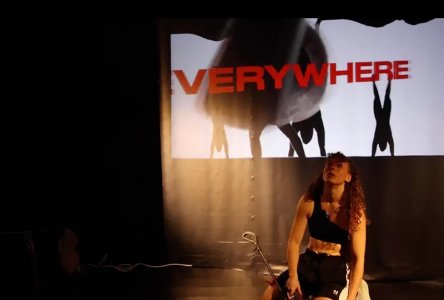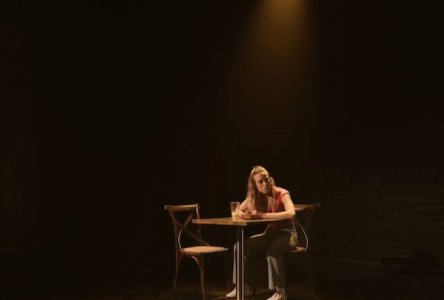
WHO'S AFRAID OF VIRGINIA WOOLF?
WHO’S AFRAID OF VIRGINIA WOOLF? Ensemble Theatre, 11 May-18 June 2017. Photography by Prudence Upton: above - Genevieve Lemon, Brandon McClelland, Claire Lovering and Darren Gilshenan
The Ensemble’s new production of Edward Albee’s 1962 classic, Who’s Afraid of Virginia Woolf? is a revelation. And that’s a thing: like so much Chekhov these days, Virginia Woolf has, over the years, become obscured by treatments that laid on the reverence like thick varnish on an Old Master. All the original light and air have long disappeared and we’ve been left with a dark drama with flashes of what used to be. As directed by Iain Sinclair with wit and forethought, the patina of the past and the subsequent cliches and expectations have been stripped away and it’s like a new play.
This production also overcomes yet another common problem: how new versions often struggle for identity beneath the long shadow still cast by the Elizabeth Taylor/Richard Burton movie of 1966. This time, Sinclair has confounded assumptions in casting well known comedic actors Genevieve Lemon and Darren Gilshenan as the central characters, Martha and George. In doing so, Sinclair caused consternation among some who have forgotten to look beyond the more obvious drama of the play.
The first act, of three, is titled “Fun and Games” and while the execution of these is mostly sardonic and often cruel, it is made deceptively palatable by being very funny. George and Martha are middle-aged, married and miserable. She is the daughter of the president of a New England college; George is an associate professor of history who has not lived up to early potential and will never rise to take over the department, let alone succeed his father-in-law.
They have been at a college staff party and return home, late, with a newly-appointed young academic and his wife in tow. Nick (Brandon McClelland) and Honey (Claire Lovering) are at first flattered and nervous but as quantities of gin and bourbon are drunk, the atmosphere swings from false bonhomie to something more sinister and disturbing. The disappointment and animosity between George and Martha is palpable and all too real, even as their garrulous behaviour becomes ever more surreal and alarming.
Set and costume designer Michael Hankin and lighting designer Sian-James Holland have created one of the Ensemble’s more successful environments in the older couple’s messy, cluttered yet comfortable faculty house living room, with dark timber panelling and the accoutrements of academic living: a lot of books and booze. The two men are almost comically pedagogical in their tweed and chinos (Nick) and shapeless cardie and melange of tan and beige (George). The women, on the other hand, are clad in the confusion of styles and intentions that signified the shifting mores of the early ’60s.
The precision and care in the visual aspects of this production are matched by the verve and dazzling execution of Albee’s killer script. The play runs almost three hours, including interval, and while the pace is at its fastest in the opening act, the next two are where it becomes furious.

As the utterly disheartened but still belligerent Martha, Genevieve Lemon demonstrates why she is one of our most admired actresses. Yes, she is very, very funny, but that comic mind and timing are what anchor her abilities. She can summon rage and pain from the depths of a talent where nuance and ultra-fine decisions are brought to bear moment by moment. A superb, heart-wrenching performance.
Opposite her in so many ways is Darren Gilshenan’s George. This is a man for whom watchful stillness and spiritual inertia are disrupted by outbursts of sarcasm and rage that barely disguise his misery. Coming from one of our most loved theatrical clowns, it’s in wild contrast to his usual casting. It serves to highlight the pain at the heart of the central relationship – so intense and corrosive that they are slowly but surely disintegrating each other.
Across the divide of age and life experience is the naive Honey and Claire Lovering’s almost imperceptible descent into wobbly drunken oblivion is a masterpiece of subtle observation and comedy. On opening night her sudden break out into unintentionally hilarious interpretive dance was followed by spontaneous applause from the audience.
As her smug husband Nick, Brandon McClelland visibly grows into his self esteem as the ghastly “party” rolls on. He is the personification of white picket fence suburban academe left over from the 1950s, but on this night too much alcohol and unexpected opportunity cracks his facade. What is revealed is more Mad Men than modern man.
All in all, this production is a major achievement by all. It’s engrossing, amusing, terrifying and deeply satisfying. Really recommended.



